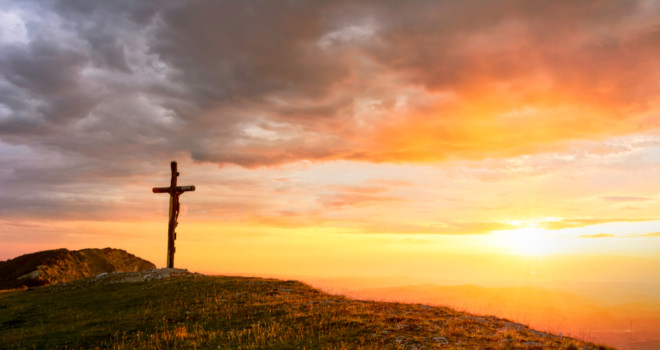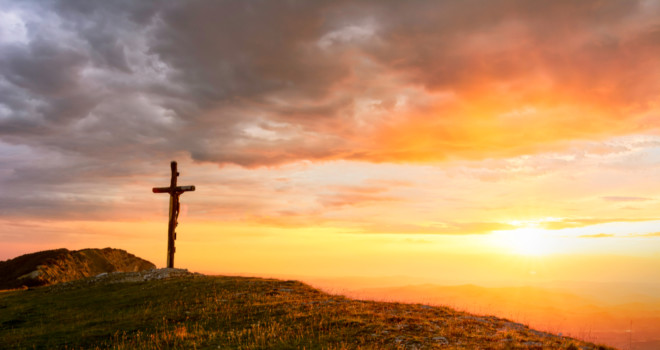The veil is thin when God manifests Himself in various periods of history through miracles. They are extraordinary events that show in time and space God’s power and glory, disclosures that build up faith and bring about salvation. Those occasions in which a miracle restores health or even life show God’s goodness and benevolence.
We read of many miracles in the Gospels and the Acts of the Apostles. Why do they seem so rare now? St. Gregory the Great, who lived in the sixth century, explained: “These signs were needed in the beginning, but not in later years when faith had become rooted in the world. Then, the Church itself became the principal sign of God among men.”
Miracles have been reported in great numbers throughout history. As part of her mission, the Church distinguishes the authentic from the fake. Dr. Francis Collins, one of the world’s renowned scientists, affirms:
Miracles do not pose an irreconcilable conflict for the believer who trusts in science as a means to investigate the natural world, and who sees that the natural world is ruled by laws. If, like me, you admit that there might exist something or someone outside of nature, then there is no logical reason why that force could not on rare occasions stage an invasion.
Among the most famous of miracles is Mary’s apparition to St. Bernadette Soubirous in Lourdes, France. In 1882, a medical bureau was established to test the authenticity of the cures that followed the apparitions. Today, the bureau acts as a “first-instance tribunal,” which sends its findings to the International Medical Committee of Lourdes for a final verdict. This committee is under medical, not ecclesiastical, supervision. Thousands of people have sought to have their cases confirmed as miracles, but only a few cases have been declared scientifically inexplicable.
In his book The Voyage to Lourdes, Alexis Carrel, a Nobel laureate in medicine, tells the story of a young woman, Mary Baille, who was dying of tubercular peritonitis. Her sudden cure took place in Lourdes on May 28, 1902, under Carrel’s skeptical eyes. The gift of faith came to Carrel after many years, following his spellbinding experience in Lourdes.
The Church follows certain processes for the beatification and canonization of saints. Except for the case of martyrs, two miracles obtained through the intercession of the candidate are usually required, one for beatification, and one for canonization. The Church will always be most careful in certifying miracles and will not be overawed just because the doctor who states that medical science cannot explain the healing happens to be a Nobel laureate. The Church shows extreme carefulness, because in doing so she simply cares for that supernatural vitality of hers, of which miracles are the most palpable signs.
The Miracle of the Sun occurred in Fatima on October 13, 1917. On October 15, 1917, the secular newspaper O Seculo printed on its front page, “COMO O SOL BAILOU AD MEDIO DIA EM FATIMA” (How the sun danced at midday in Fatima). Msgr. William C. McGrath, who studied the event, gave a description:
Gradually the sun grew pale, lost its normal color, and appeared as a silver disk at which all could gaze directly without even shading their eyes. . . . Then, while the crowd went on its knees in abject terror, the sun suddenly seemed to be torn loose from its place in the heavens . . . as it zigzagged through the skies while from all parts of the now terrified multitude arose cries of repentance and appeals for mercy. . . . Suddenly, as if arrested in its downward plunge by an invisible heavenly hand, it paused for a moment and then, in the same series of swirling motions it began to climb upward till it resumed its accustomed place in the heavens. Gone was the silver disk with the brilliant rays. It was once more a ball of fire at which nobody could look with unshaded eyes.

While people looked at one another, still trembling from their terrifying experience and not yet sure that some further disaster would overtake them, a cry of astonishment was heard on every side. Their rain-sodden garments had suddenly dried.
There were about seventy thousand people gathered on that occasion, persons of all walks of life, mostly inhabitants of the neighboring areas, many of them skeptical and unbelieving. What was clear was that it was a supernatural event and a great miracle.
Sister Lúcia related how the Virgin Mary told her on the previous July 13 and on September 13 that a sign would be given on October 13. On September 13, 1917, Sister Lúcia told Our Lady, “They have asked me to ask you many things, the cure of some sick persons, of a deaf mute.” “Yes,” Our Lady answered, “I will cure some, others no. In October, I will work a miracle so that all will believe.”
Pope Pius XII, who declared the Assumption of Our Lady a dogma, revealed in a handwritten note that he had seen the miracle of the sun four times from the Vatican gardens. He wrote: “I have seen the ‘miracle of the sun,’ this is the pure truth.” Since his experience of the phenomenon happened on November 1, 1950, when the Pope proclaimed the dogma of the Assumption, it seems to be a supernatural confirmation of the dogma.
Editor’s note: This article is an excerpt from Why God Hides, which is available from Sophia Institute Press.












